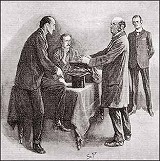“I fear it is rather too late an hour for explanations,” said Holmes. “Besides, there are one or two details which are not finished off, and it is one of those cases which are worth working out to the very end. If you will come round once more to my rooms at six o’clock to-morrow, I think I shall be able to show you that even now you have not grasped the entire meaning of this business, which presents some features which make it absolutely original in the history of crime. If ever I permit you to chronicle any more of my little problems, Watson, I foresee that you will enliven your pages by an account of the singular adventure of the Napoleonic busts.”
When we met again next evening, Lestrade was furnished with much information concerning our prisoner. His name, it appeared, was Beppo, second name unknown. He was a well-known ne’er-do-well among the Italian colony. He had once been a skilful sculptor and had earned an honest living, but he had taken to evil courses and had twice already been in jail - once for a petty theft, and once, as we had already heard, for stabbing a fellow-countryman. He could talk English perfectly well. His reasons for destroying the busts were still unknown, and he refused to answer any questions upon the subject, but the police had discovered that these same busts might very well have been made by his own hands, since he was engaged in this class of work at the establishment of Gelder & Co. To all this information, much of which we already knew, Holmes listened with polite attention, but I, who knew him so well, could clearly see that his thoughts were elsewhere, and I detected a mixture of mingled uneasiness and expectation beneath that mask which he was wont to assume. At last he started in his chair, and his eyes brightened. There had been a ring at the bell. A minute later we heard steps upon the stairs, and an elderly red-faced man with grizzled side-whiskers was ushered in. In his right hand he carried an old-fashioned carpet-bag, which he placed upon the table.
“Is Mr. Sherlock Holmes here?”
My friend bowed and smiled. “Mr. Sandeford, of Reading, I suppose?” said he.
“Yes, sir, I fear that I am a little late, but the trains were awkward. You wrote to me about a bust that is in my possession.”
“Exactly.”
“I have your letter here. You said, ‘I desire to possess a copy of Devine’s Napoleon, and am prepared to pay you ten pounds for the one which is in your possession.’ Is that right?”
“Certainly.”
“I was very much surprised at your letter, for I could not imagine how you knew that I owned such a thing.”
“Of course you must have been surprised, but the explanation is very simple. Mr. Harding, of Harding Brothers, said that they had sold you their last copy, and he gave me your address.”
“Oh, that was it, was it? Did he tell you what I paid for it?”
“No, he did not.”
“Well, I am an honest man, though not a very rich one. I only gave fifteen shillings for the bust, and I think you ought to know that before I take ten pounds from you.”
“I am sure the scruple does you honour, Mr. Sandeford. But I have named that price, so I intend to stick to it.”
“Well, it is very handsome of you, Mr. Holmes. I brought the bust up with me, as you asked me to do. Here it is!” He opened his bag, and at last we saw placed upon our table a complete specimen of that bust which we had already seen more than once in fragments.

Holmes took a paper from his pocket and laid a ten-pound note upon the table.